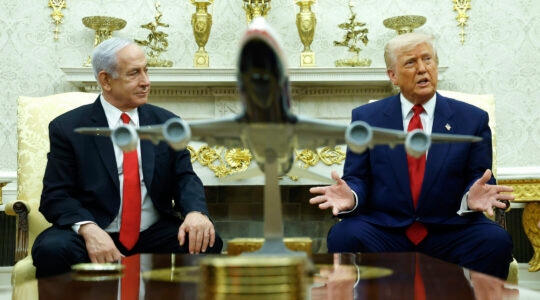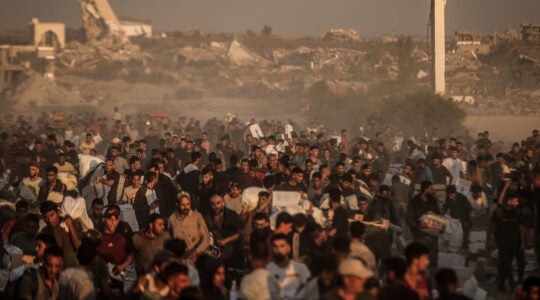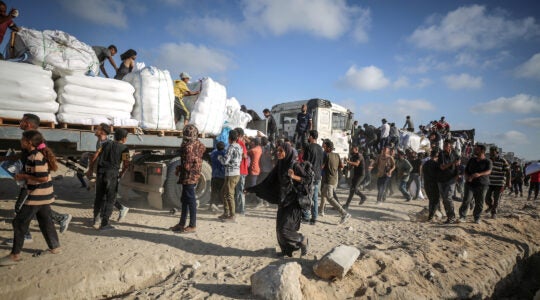TEL AVIV (JTA) — Jews have lived in Iran since biblical times, surviving 2,700 years of rotating dynasties from Persian kings and Mongol rulers to today’s ayatollahs, all the while building rich lives and a tightly knit community many are reluctant to leave.
So when a plane carrying 40 Iranian Jews landed at Tel Aviv’s Ben-Gurion Airport last week amid cheers and the glare of TV cameras, many hailed the new immigrants’ arrival as a sign that Iran’s remaining Jews may have had enough of life in the Islamic Republic.
But others, Iranian Jews among them, point out that the relatively small number of Jewish emigrants from the country — only 40 came last week, despite the offer of a $10,000 gift plus immigrant benefits for each arriving Iranian immigrant to Israel — demonstrates just the opposite: that Iran’s Jews are reluctant to leave their home country despite the difficult situation there.
“The question is why should they leave, not why should they stay,” said Eldad Pardo, an Iran expert at Hebrew University’s Truman Center.
Before the Islamic revolution of 1979, some 100,000 Jews lived in Iran. Many of them fled, fearing for their futures under a fundamentalist Islamic regime. Some came to Israel but the majority headed to the United States, especially to southern California and parts of Queens and Long Island, in New York.
With most of those so inclined already gone, those remaining in Iran have proven more difficult to uproot. The situation, would have to become very dire for Iran’s Jews to abandon the country en masse, Pardo said.
There are some 20,000 to 25,000 Jews remaining in Iran, where President Mahmoud Ahmadinejad’s repeated condemnations of Israel and a general air of repression and economic hardship has made life increasingly uncomfortable for Iranian Jews.
Yet few have taken up the financial incentives offered to them to immigrate to the Jewish state.
Iran’s Jews constitute the Diaspora’s oldest Jewish community, represent the largest Jewish population in a Muslim country and, according to their own accounts, have been treated fairly well by their government.
They boast kosher restaurants and have packed synagogues and Jewish social clubs. Since the 1979 revolution, Islamic authorities generally have followed a policy that distinguishes between Zionism and Judaism, with a tacit agreement that they will guarantee the Jews’ safety so long as the Jews keep their distance from Israel.
But that understanding is being strained, some say, by Ahmadinejad’s repeated calls for Israel’s destruction, denials of the Holocaust and recent hostile messages in Iranian media against Jews.
One Israeli journalist, Ha’aretz’s Yossi Melman, argued in a column Monday that the unusually public nature of the arrival of the 40 Iranians last week was dangerous in itself.
He excoriated the Jewish Agency for Israel and the International Fellowship of Christians and Jews, which facilitated the mission and are bankrolling the $10,000 gifts, for not keeping the Jews’ immigration a secret. In the past, other similar operations undertaken to bring Jews out of Muslim countries were kept quiet out of concern for the safety of the immigrants’ families and those left behind.
Melman asked why the Jewish Agency and the International Fellowship would turn the arrival of the 40 immigrants into a media circus “when they know that hanging in the balance is the fate of entire Jewish community in a Muslim country hostile to Israel.”
Media outlets from all over the world carried news of last week’s arrival of the Iranian immigrants.
The Jewish Agency declined to respond to a request for comment on this story.
Rabbi Yechiel Eckstein, founder of the International Fellowship of Christians and Jews, which helped raise the $10,000-per-person grants for the Iranian Jews from evangelical Christians in the United States, said he feared the community was at risk.
“It’s like sitting on side of a volcano,” Eckstein said. “Lava is gathering but you can still live there. But the haunting question is if the volcano were to erupt.”
Eckstein compared the situation of Iran’s Jews to that of the Jews of Europe during the 1930s. They too, he said, thought their neighbors would not turn on them and that the fanatical Hitler soon would be gone.
Iran’s Jews reject that comparison and say Iran does not have the history of anti-Semitism that Europe did throughout the centuries preceding the Holocaust. In 2007, one of Iran’s most popular TV programs was a mini-series about the Holocaust that portrays Jews sympathetically.
For their part, Jewish leaders in Iran, perhaps fearing repercussions, quickly spoke out against the operation.
“This is a misinformation campaign, a campaign of lies against Iran and its Jewish community,” Syamak Morehtzedek, the head of the Tehran Jewish Committee, told The Associated Press. “We are one of the oldest communities in Iran. We are free to practice our religion. Anti-Semitism is a Western phenomenon but Jews have never been in danger in Iran.”
Some Iranian Jews now living in Israel said the radical positions of Iranian officialdom do not reflect feelings on the street.
“People feel good, they don’t feel fear. They feel they are living normal lives,” said Sharona Cohen. Her relatives were among those who arrived in last week’s operation. “There is anti-Semitism here and there, but nothing they feel on a daily basis.”
JTA has documented Jewish history in real-time for over a century. Keep our journalism strong by joining us in supporting independent, award-winning reporting.





